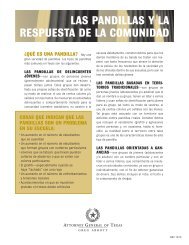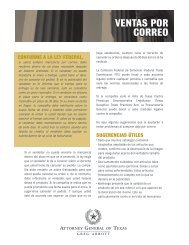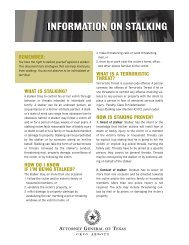Create successful ePaper yourself
Turn your PDF publications into a flip-book with our unique Google optimized e-Paper software.
when you get<br />
Married...<br />
2
A Message from the <strong>Attorney</strong> <strong>General</strong>:<br />
Marriage is a great adventure, full of joys as well as challenges. One of the best<br />
things you can do to prepare for marriage is to talk in advance about the issues<br />
that will probably arise: What are your respective definitions of a good husband<br />
or a good wife? What are your views on child rearing? Do you share the<br />
same values and personal interests?<br />
This handbook, which is provided in accordance with Section 2.014<br />
of the <strong>Texas</strong> Family Code, will help you discuss these and other<br />
important issues. Written with the help of a broad-based advisory committee,<br />
this handbook also contains important legal information about shared property<br />
and child support. Hopefully you will find it helpful.<br />
Congratulations on your commitment to marriage. On behalf of the State of<br />
<strong>Texas</strong>, we wish you the very best.<br />
Greg Abbott<br />
<strong>Attorney</strong> <strong>General</strong> of <strong>Texas</strong><br />
Premarital handbook Advisory committee (1999-2002)<br />
Rev. Raymond Bryant Ms. Kenna Ramirez<br />
St. Paul African Methodist Episcopal El Paso<br />
Church Dallas<br />
Mr. Stewart Gagnon The Honorable J.D. Salinas<br />
Fulbright and Jaworski County Clerk – Hidalgo County<br />
Houston Edinburg<br />
The Honorable Janice Lyons Pastor Rick Scarborough<br />
County Clerk – Taylor County First Baptist Church<br />
Abilene Pearland<br />
Thomas Milholland, Ph.D. Ms. Susan Speight<br />
Abilene Christian University Immediate Past President, <strong>Texas</strong> Association<br />
President, <strong>Texas</strong> Association of Marriage of Marriage & Family Therapists<br />
& Family Therapists Dickinson<br />
Abilene<br />
Mr. Victor Negron<br />
Family Law <strong>Attorney</strong><br />
San Antonio
why get married?<br />
Love. Companionship. Financial support and the comforts<br />
of a shared home. Intimacy. Children.<br />
People marry for different reasons. There are a few things that almost every‑<br />
body includes if you ask them what they want from their marriage. But it doesn’t<br />
really matter what others want out of marriage. Different people want differ‑<br />
ent things. What matters is what YOU and YOUR SPOUSE want?<br />
What is your definition of a good husband?<br />
His answer:<br />
Her answer:<br />
What is your definition of a good wife?<br />
Her answer:<br />
His answer:<br />
11
2<br />
What is your definition of a good marriage?<br />
His answer:<br />
Her answer:<br />
A husband and wife may expect very different things from their marriage. This is okay. Your<br />
marriage can be happy as long as each of you is getting what you consider to be important,<br />
even if these are different things.<br />
Make a list of the things that you want most from your marriage. Then compare your lists.<br />
What do you want from your marriage?<br />
Her answer:<br />
His answer:<br />
You need to know what your spouse wants and what is most important to your spouse. Number<br />
your list in order of importance. Then compare your lists again to see what your spouse<br />
wants and needs most.
What does your spouse want most? What does he or she really need to have in order to be happy<br />
with your marriage?<br />
Knowing what your spouse wants is only half the story. You also must know how to provide<br />
it to him or her. For example, if your spouse wants to feel loved, you need to know what actions<br />
make your spouse feel loved. You need to know how your spouse defines that experience.<br />
Another example: for many people, physical intimacy is an important part of marriage. If your<br />
spouse gave a high priority to physical intimacy, it is not enough to provide what you consider<br />
to be a satisfying intimate relationship. You need to know what your spouse wants.<br />
Each of you should list a few examples of specific behaviors that would give you what you are<br />
looking for in your relationship. And for some of those actions, you might want to write down<br />
approximately how often you would like it to happen. There is no right or wrong answer to<br />
these questions. It’s whatever works for you.<br />
List specific and positive actions that are inexpensive and that your spouse could do often. Examples<br />
would be: A hug. A compliment. Make my favorite dessert. Give me flowers. Massage my neck and<br />
shoulders. Whatever you want.<br />
His list:<br />
It makes me happy when you:<br />
Her list:<br />
It makes me happy when you:<br />
It is possible that when you learn more about what your spouse wants from you, you will have<br />
some doubts about whether you can or want to provide it. In this case, you have something<br />
you need to talk about. This will be a chance for you to practice good communication skills.<br />
You will need to work out a way to have a relationship that is satisfying and acceptable to both<br />
of you.<br />
You may want to read through this book and talk about the questions that follow. If you are<br />
not yet married, give yourself time to think through these issues before you make a final decision.<br />
If you are already married, or if you are already sure you are making the right decision, it<br />
is still a good idea to learn more about each other and improve your communication skills.<br />
3
4<br />
Personalities: How are<br />
you different, and how are you alike?<br />
You don’t have to be alike to get along. Chances are you are alike in some<br />
ways and different in others. You may be quite different. Opposites often at‑<br />
tract! Differences are fine if you respect and appreciate the differences<br />
between you.<br />
Do you remember what it was about your spouse that first caught your eye? Maybe it was<br />
something about the way he or she looked or smiled or laughed. Maybe you liked his polite<br />
manners or thought she was easy to talk to. Later, when you got to know each other better,<br />
you came to appreciate traits such as honesty, warmth, kindness or generosity. And<br />
these are the traits that probably helped you realize you wanted to marry this person—to<br />
spend the rest of your life with him or her.<br />
What was it that originally attracted you to your spouse?<br />
She says:<br />
He says:<br />
What was it about your spouse that led you to want to marry him or her?<br />
Things about her (he says):<br />
Things about him (she says):
Name some ways you think you are alike:<br />
How she says we are alike:<br />
How he says we are alike:<br />
Name some ways you think you are different:<br />
How he thinks we are different:<br />
How she thinks we are different:<br />
Sometimes differences can be strengths. Discuss: What are some ways that your different<br />
strengths work together? How do you react in a crisis or emergency? Is one of you calm while<br />
the other gets excited? How can you use your strengths to help each other?<br />
Compare some of your ways of reacting and showing feelings. How do you act when you<br />
are angry—do you clam up or do you raise your voice and argue? When you are hurt, do<br />
you withdraw, lash out or cry?<br />
5
6<br />
Conflict and Communication<br />
Conflicts are inevitable. The important thing is how you handle them.<br />
Fighting doesn’t help, but talking does. Here are some steps as well as<br />
some DOs and DON’Ts for resolving conflicts in marriage.<br />
Talk about conflicts at a time and in a setting where you are both relaxed. Explore ideas<br />
together. Most problems have more than one possible solution. If you cannot remain positive<br />
and friendly, stop the discussion and try again some other time. Don’t give up. Most problems<br />
will not go away if you ignore them.<br />
Agree to take turns talking and not to interrupt. Explain your point of view as honestly and<br />
respectfully as possible. Answer your spouse’s questions as truthfully and completely as possible.<br />
Listen to your spouse’s point of view and then try to repeat what your spouse said in<br />
your own words. Ask if you understood and successfully articulated his or her point of view.<br />
Ask questions, and listen respectfully to the answers. Sometimes an apparent problem will be<br />
resolved or even disappear once you fully understand each other.<br />
Avoid “blaming” your spouse for the problem. When you need to explain how you feel, use the<br />
word “I” rather than the word “you.”<br />
DO<br />
• Do talk about areas of conflict.<br />
• Do explain your point of view thoroughly and honestly.<br />
• Do listen respectfully to everything your spouse has to say.<br />
DON’T<br />
• Don’t continue the discussion if it ends up in an argument.<br />
• Don’t give in to anger, sarcasm, name-calling, verbal abuse, threats or accusations.<br />
• Don’t agree to a solution that you cannot sincerely and willingly accept.<br />
Ask yourself, “What is the issue?” Then, explain your view of the issue and see if you can agree<br />
on the problem. Next, examine the facts. State your opinion about those facts. In the process,<br />
share your emotions. Last, try to establish a clear goal.<br />
Brainstorm about solutions. Think of any and all ideas that might help resolve the problem.<br />
Consider all solutions with an open mind, even if you think some sound silly or will not work.<br />
Make a list of choices and see if you can find some that you are both willing to try. There isn’t<br />
a “right” answer. Sometimes the answer is that you agree to disagree. You just need to find<br />
an answer you can both accept. Every solution has a positive side and a negative side. Which<br />
solution has the most advantages?
Have you resolved a problem in your relationship yet? What was the problem and what was the<br />
solution you found? Did you do the “DOs” and avoid the “DON’Ts”? Was it a good solution that<br />
was okay with both of you? Was there a better solution that you can think of now?<br />
If you have not had a conflict yet, sooner or later it will happen. It’s human nature. At some<br />
point, a minor thing might irritate you. Or, one of you will want to do one thing when the<br />
other wants to do something else. It’s Saturday night, and one of you wants to go to a movie<br />
when the other wants to stay home and watch football. One of you wants to shop at the mall<br />
while the other would rather go to the lake. Try working through the conflict so you find a<br />
solution that’s fair to both of you.<br />
If at some point in your marriage you find you have a conflict that is especially hard to resolve,<br />
consider seeking help. A professional may be able to help you work through a difficult time.<br />
You can contact the <strong>Texas</strong> Association for Marriage and Family Therapy at (800) 270-4320 or<br />
www.txmft.org for the name of a qualified therapist. Or, for faith-based guidance, you can call<br />
the church or synagogue of your choice. You can also consult your local telephone directory<br />
under “Marriage and Family Therapists,” “Psychologists,” “Social Workers” or “Psychotherapists.”<br />
No one should ever hit you or threaten you or your children, your family or your pets<br />
with physical harm. If you are not yet married and you have any concerns that your future<br />
spouse could be violent toward you, stop and take some time to reconsider. If at any<br />
point you fear for your own safety or that of your family, children or pets, call the National<br />
Domestic Violence Hotline at (800) 799-7233, (TTY ) (800) 787-3224 or your local<br />
domestic violence shelter.<br />
7
8<br />
Children<br />
Will you have children? When, and how many? How will you raise them? Who<br />
will make the decisions about them? Who will take care of them? Who will<br />
discipline them and how?<br />
Many couples dream of having children and look forward to starting their own families. Children<br />
are often one of the most positive and valuable outcomes of marriage, but they can place<br />
new strains on your relationship and introduce new conflicts and difficulties that you didn’t<br />
expect. Your first child may be the first serious test of your ability to communicate and solve<br />
problems together. Here are some examples of issues you may need to work through:<br />
Issue: Sharing Responsibility. Babies are a 24-hour responsibility. For all the joy<br />
that you may experience while caring for your new baby, there may be times when you struggle<br />
with losing free time-time for yourself, time for leisure activities that you used to enjoy and<br />
romantic time with each other. You will also have to determine how the responsibility for child<br />
care will be divided between you. If the mother is at home all day caring for the baby, she may<br />
think that it would only be fair for the father to take a turn when he gets home. If he has been<br />
working hard all day and he is the sole breadwinner, he may think he deserves a little rest, not<br />
a shift of child caring. Or maybe both parents work and each thinks the other should help<br />
more with child care. How will you resolve these issues?<br />
How do you think you will share the responsibility for caring for a baby? Talk about who will<br />
do each of these tasks, how often, and when.<br />
• Feeding the baby during the night.<br />
• Changing the baby’s diapers.<br />
• Giving the baby a bath.<br />
• Staying home from work when the baby is sick.<br />
• Playing with the baby.<br />
Issue: Managing a New Financial Responsibility. If the wife works outside the home,<br />
she will need to spend at least some time away from her job when the baby is born. If her job<br />
does not provide paid maternity leave, this may mean a loss of income. If one of you gives up<br />
your job to stay at home and take care of the baby, it will mean an extended loss of income. If<br />
you both work outside the home, some form of child care will be necessary, and this is a significant<br />
expense for many couples. There are other expenses too, of course: baby food, clothing,<br />
diapers and many other things you might want or need to provide for your baby. When you<br />
take all these factors into consideration, quite a few couples can expect to feel the impact of<br />
reduced income and/or increased expenses.<br />
Fact: According to a recent study, a two-parent family spends anywhere from $6,000 to<br />
$12,000 on a child in the first year. Estimates show that it costs $200,000 to raise a child<br />
from birth to age 18.
Questions for discussion:<br />
• The father should discipline the children: agree, disagree or undecided?<br />
• A mother should not work outside the home unless her children are in school: agree,<br />
disagree or undecided?<br />
• Children should never be spanked: agree, disagree or undecided?<br />
As a parent, unless a court order has been issued affecting your parental rights, you have<br />
certain rights and responsibilities. You have the right, for as long as your child is a minor, to<br />
determine where your child will live, make legal decisions for your child, guide your child’s<br />
education, give consent to your minor child’s marriage or enlistment in the armed forces, make<br />
choices about medical care, and direct your child’s religious and moral training.<br />
You have a legal duty to support your child. You are required by law to provide food, clothing,<br />
shelter, education, and medical and dental care. You also have a duty to protect, control and<br />
reasonably discipline your child.<br />
If you fail to meet these responsibilities, your rights as a parent may be terminated. You also<br />
may be held liable for the cost of caring for your children.<br />
In some circumstances, you can be held liable for property damage caused by the delinquent<br />
conduct of your children, if their conduct is a result of your failure to control and reasonably<br />
discipline them.<br />
If You Already Have a Child<br />
If you or your spouse has been married before, do either of you have children? Is it possible<br />
that one of you has a child anywhere outside of marriage? If so, you will both need to be aware<br />
of the financial responsibility that you still have for your children from a previous relationship<br />
or your spouse’s children from a previous relationship.<br />
Your children from the previous relationship will need your emotional support too, and they<br />
still need to spend time with you. When will you spend time with your children? Will they<br />
visit you? How often and for how long? Will they spend holidays with you? Is this okay with<br />
your spouse? What if your child wanted or needed to come live with you?<br />
Write out your plan for when the children will visit, where they will stay in your house and<br />
how long they will stay.<br />
9
10<br />
Have you talked to your children about your new spouse and your decision to remarry? How did<br />
they react? How do they feel? Do they like your new spouse?<br />
Here are some special questions and answers that you might need to<br />
consider if you are getting married and you already have a child.<br />
This is my second marriage. My new spouse and I plan to start a family. How will this affect my<br />
responsibilities to my children from my first marriage?<br />
Parents have both a legal and moral obligation to support and care for all of their children,<br />
including children from previous relationships. Getting married again does not release you<br />
from the legal requirement to support children born before your new marriage. It also does<br />
not affect your visitation rights.<br />
Child support is normally paid to the parent who has primary custody of the children. In determining<br />
the amount of support to be paid, the court follows a formula set by law. The formula is<br />
generally based on the number of children involved and the paying parent’s income. The court<br />
also orders payment of medical expenses and the cost of health insurance for the children. The<br />
court orders that the child support be automatically withheld from your paycheck.<br />
My future husband’s former girlfriend had a baby, which she claims is his child. He did not agree<br />
to having a baby and says the baby is not his child. Can she cause trouble for us after we are married?<br />
Regardless of whether your future husband “agreed” to get his former girlfriend pregnant, he is<br />
financially responsible for the child if he is the father. The attorney general or a court can order<br />
a paternity test that will establish whether or not he is the biological father of the child. He<br />
can be named the legal father by default if he refuses to take the test. If he is named the legal<br />
father, he will be ordered to pay child support. If he fathered the child, he is legally responsible<br />
for that child.<br />
My former spouse is also getting remarried and has custody of our children. Will I still have to<br />
pay child support? Will the amount be lower?<br />
You are still required to pay the full amount of child support ordered by the court. In fact, the<br />
court is not allowed to consider how much the new spouse makes when calculating how much<br />
you owe.
I can’t afford to pay the child support I owe. What should I do?<br />
Only the court can change the amount of child support you must pay. The amount may be<br />
altered if there has been a material and substantial change in your circumstances or those of<br />
your children, or if it has been three years since the last child support order took effect and<br />
your current monthly payments vary from the legal guidelines by at least 20% or $100. You<br />
may request a review of your child support order by contacting the Office of the <strong>Attorney</strong><br />
<strong>General</strong> or a private attorney.<br />
What will happen if I do not pay the child support I owe?<br />
A child support order can be enforced and the payments owed can be collected by the Office<br />
of the <strong>Attorney</strong> <strong>General</strong>, your local county Domestic Relations Office, or a parent or their attorney.<br />
A variety of methods are used to collect the child support obligations, including:<br />
• requiring your employer to deduct the child support from your paycheck;<br />
• intercepting your federal income tax refund check or state lottery winnings;<br />
• filing a lien against your property;<br />
• seeking to have your driver’s, professional, and hunting and fishing licenses suspended; and<br />
• reporting the delinquency to credit bureaus.<br />
In addition to these measures, the court may be asked to enforce the child support order.<br />
The judge may sentence you to jail for contempt of court and enter a judgment for past due<br />
child support if you fail to make your court-ordered child support payments.<br />
I send my child support checks on time, but my former spouse refuses to let me see my kids. What<br />
should I do?<br />
Child support and visitation rights may seem like interrelated personal issues, but they are<br />
separate legal issues. You and your former spouse must obey all court orders related to both<br />
of these issues. In other words, a parent cannot refuse to pay child support because the other<br />
parent is refusing to allow visitation. At the same time, the custodial parent may not deny<br />
visitation to a noncustodial parent who fails to pay child support.<br />
Some <strong>Texas</strong> counties have visitation enforcement programs. You may also hire a private attorney<br />
to represent you in custody or visitation cases. If you cannot afford an attorney, there<br />
may be a Legal Aid program in your area which provides free legal services in matters such as<br />
these. The Family Law Hotline, at (800) 777-3247, is a nonprofit organization specializing<br />
in family law. The State Bar of <strong>Texas</strong> also has a program called <strong>Texas</strong> Lawyers Care to assist<br />
people who cannot afford a lawyer. <strong>Texas</strong> Lawyers Care can be reached by calling the State<br />
Bar at (800) 204-2222. The Office of the <strong>Attorney</strong> <strong>General</strong> is not authorized (by federal law)<br />
to intervene in the matter of visitation.<br />
Are there any free or low-cost resources where I can learn more about child support services?<br />
Some child support services are provided by the Office of the <strong>Attorney</strong> <strong>General</strong> at a minimal<br />
cost. If you would like further information, visit the OAG website at www.texasattorneygeneral.gov<br />
for the nearest child support office. Your county may also have a Domestic Relations<br />
Office which may be able to help you with child support and visitation services.<br />
11
12<br />
Money<br />
Who handles the money? And how? How have you handled financial difficulties<br />
in the past? How many bank accounts will you have? Who will control them and<br />
who will have access to them? Who will balance the checkbooks? Who will pay<br />
the bills?<br />
Money is a notorious source of conflict in marriage. As with any other conflict, you will have to<br />
practice good communication and problem-solving skills. This means talking through issues<br />
at a time when you can both remain calm, listening to each other’s point of view, and working<br />
together to come up with mutually satisfactory solutions.<br />
In addition, for your mutual benefit, it will help if you both practice good money management<br />
skills. This means planning ahead, keeping track of where your money goes, and setting<br />
realistic spending limits.<br />
If you currently have separate finances, each of you should write out your current budget. Write<br />
down how much you make and how much you spend, so that you account for where all your<br />
money goes.<br />
His Hers<br />
Income: $ $<br />
Necessary expenses:<br />
Optional spending:<br />
$ $<br />
$ $<br />
$ $<br />
$ $<br />
$ $<br />
$ $<br />
$ $<br />
$ $<br />
What’s left: $ $
What do you do with the money that’s left?<br />
His Hers<br />
Do you have any debts? Credit card balances? Student loans? What is your plan for paying them off?<br />
His debts/assets: Her debts/assets:<br />
Many couples pool their financial resources. Even if you decide to keep your money separate,<br />
you will have shared expenses. If you have not yet worked out a plan to share necessary living<br />
expenses, you should.<br />
Our Budget<br />
Necessary expenses:<br />
Rent/Mortgage $<br />
Payments on debts $<br />
Groceries $<br />
Clothing $<br />
Electricity $<br />
Gas $<br />
Water $<br />
Telephone $<br />
Car payment $<br />
Car insurance $<br />
Gasoline $<br />
Health/life insurance $<br />
Medical Expenses $<br />
Dentist $<br />
Pets<br />
Other regular necessary expenses:<br />
$<br />
$<br />
$<br />
$<br />
TOTAL: $<br />
13
14<br />
Will you combine your income to meet your joint expenses? Contribute equally? What is<br />
your plan?<br />
There are plenty of other things to talk about: Which expenses are really necessary and which are<br />
optional? How much will you save? Will you tithe or give to charity? Will you need to financialy<br />
help or support other members of either spouse’s family? If you have anything left over at the end<br />
of the month, what will you spend it on?<br />
How much do you think you need to have in the bank for a “rainy day”? Can you think of a time<br />
when you got caught short by an unexpected expense? What happened? What did you do? What<br />
could happen to you now, and how would you handle it?<br />
More questions for discussion:<br />
What are your career plans for the future? Does either of you expect to go back to or continue<br />
school? Do you think you will need to move because of a job?<br />
It is important to place financial security ahead of having good times with friends or the family:<br />
agree, disagree or undecided?<br />
Husband and wife should have separate bank accounts that they each individually control: agree,<br />
disagree or undecided?<br />
The person who makes the money should have the final say about how it will be spent: agree,<br />
disagree or undecided?<br />
You may agree that each of you should have an “allowance”—a certain amount of money to spend<br />
as you please. How much?<br />
Suppose you see something that you want or that you would like to buy for both of you. What<br />
amount of money would you spend without consulting the other first? $20? $50? $100?
Lifestyle<br />
Chances are, your relationship was built on shared interests and time you<br />
spent together doing things you both enjoy. Good times and good conversa‑<br />
tion helped make your marriage happen. They can help make your marriage last.<br />
When you were dating, you had fun with one another and enjoyed each other’s company. You<br />
probably noticed what your spouse liked to do and talk about. You probably learned about<br />
those things and showed an interest in them.<br />
Over time, your interests and your spouse’s will probably change. You can grow and change<br />
together if you take the trouble to learn about and appreciate each other’s interests, the way<br />
you did when you were getting to know each other.<br />
You know you have to communicate about important, practical and emotional issues in your<br />
marriage. But you need to enjoy each other as well. No matter how busy you are, take some<br />
time to talk to your spouse about fun things that you know he or she likes and cares about.<br />
Arrange to spend enjoyable time together on a regular basis. It is okay to have some separate<br />
friends and activities. But you need to have fun together too. As your responsibilities increase<br />
and your family grows, it may seem harder to find the time and money for a “date.” But it is<br />
worth the effort.<br />
A “date” can be: Taking a long walk together. Renting a movie. Cooking out at the park. You<br />
can go bowling or dress up and go out for dinner. Visit a public garden. It can be anything you<br />
both want to do. The important thing is, you are doing a lot of things right at this point in<br />
your relationship. You really enjoy each other’s company. Whatever you are doing right—don’t<br />
stop doing it!<br />
What are your husband’s or wife’s top three personal interests?<br />
His:<br />
Hers:<br />
15 15
16<br />
What are the three things the two of you most like to do together?<br />
Do you know what your husband or wife did today at home or at work when you were apart?<br />
If not, ask and listen.<br />
Here are some more suggestions you may find useful in building a positive relationship with<br />
your spouse:<br />
• Listen for some interest that your spouse might have in something new.Then find out more<br />
about that thing and talk about it.<br />
• Go somewhere together, and talk while you’re there.<br />
• Leave a sweet note, buy a little gift, do a favor or give flowers.<br />
• Look for an opportunity to do something the other person’s way sometimes. Give in now<br />
and then. Apologize.<br />
• Do something for others together. Volunteer your time to make a contribution to your<br />
community or to someone in need.<br />
• Encourage, support, praise and comfort your spouse. Be on your spouse’s side.<br />
• Talk about your shared faith and values. Talk about your relationship. Share memories<br />
of good times you’ve had together.
Families<br />
What do you think of your spouse’s parents and family? Which family will you<br />
visit during holidays? Do you have their blessing to get married? What role<br />
will they play in your lives? How often will they visit you and for how long?<br />
When you visit your parents, will you both go?<br />
Something to talk about:<br />
• In-laws should be consulted about important decisions that affect your marriage: agree,<br />
disagree or undecided?<br />
• Grandparents should be consulted about how to raise the children: agree, disagree or undecided?<br />
Faith and Values<br />
What are your religious or moral beliefs? Do you share the same faith? What role will your faith<br />
play in your lives? Will you go to religious services? The same religious services? Where, and how<br />
often? For many couples, faith is an integral part of their relationship and their daily lives. It can<br />
be part of what binds them together in marriage. Other couples may not share the same faith.<br />
What about you?<br />
Discuss your faith and moral beliefs.<br />
We have the same faith.<br />
We share many basic moral beliefs.<br />
We agree on some things, not others.<br />
We have different beliefs.<br />
Not sure.<br />
List your highest moral values:<br />
His list: Her list:<br />
17 17
18<br />
Will you go to religious services?<br />
(circle one) He says: Yes No Not sure She says: Yes No Not sure<br />
How often and where?<br />
Where?<br />
He says: She says:<br />
More than once a week More than once a week<br />
Once a week Once a week<br />
Occasionally Occasionally<br />
Never Never<br />
What faith will your children be taught? Will they go to religious services?<br />
What religious services?<br />
If faith is very important to either or both of you, and you have different beliefs, then it<br />
is extra important that you are respectful of each other’s views. Showing respect for your<br />
spouse’s opinions is important in any case, but where differences in faith are involved, it<br />
is absolutely essential.
Marriage and the Law:<br />
Q & A<br />
Am I required by law to support my spouse?<br />
Under <strong>Texas</strong> law, each spouse has a duty to support the other. If you fail to meet this responsibility,<br />
you may be held financially liable to any third party who provides your spouse with food,<br />
shelter or other assistance necessary for daily living. This law applies equally to both husband<br />
and wife.<br />
Is <strong>Texas</strong> a “community property” state?<br />
In <strong>Texas</strong>, all property acquired by a married couple is presumed to be community property,<br />
which means both husband and wife own all of their property together. Under the law, husband<br />
and wife are partners in the marriage, and each has an interest in all community property.<br />
The idea is that both spouses contribute to the marriage, so both should have an interest in any<br />
property purchased or obtained during the marriage.<br />
Community property can include the couple’s homestead, other real estate, cars and other vehicles,<br />
savings, insurance and other assets such as furniture, a boat or appliances. Investments<br />
such as retirement funds, IRAs, annuities and employee stock option plans are also generally<br />
considered community property. However, an investment may have specific rules that limit<br />
your spouse’s interest. Debts and other liabilities are also shared.<br />
It does not matter whether only one spouse purchased the property - both spouses may have<br />
an interest in it. Even when only one spouse is listed as the owner of the property, it may still<br />
be considered community property jointly owned by the couple.<br />
Is our income considered “community property”?<br />
Yes. In most marriages these days, both spouses work and bring income to the household.<br />
Under <strong>Texas</strong> law, if the husband and wife mix and combine their earnings and merge their<br />
finances, they share responsibility for the management and control of the income.<br />
If only one spouse works and is the sole source of income for the household, the earnings and<br />
everything bought with those earnings are still considered community property. Both spouses<br />
share responsibility for deciding how to use it.<br />
What if I already own a house or car before we marry?<br />
Any property owned by a spouse prior to the marriage, or acquired by gift or inheritance<br />
during the marriage, is considered separate property. Also, if one spouse recovers money or<br />
property for personal injuries that happen during the marriage, that money or property is<br />
considered separate (except for lost wages or earnings). In some situations, property purchased<br />
after marriage with separate funds may be considered separate property. People who plan to<br />
marry may also agree in writing to consider some or all of their holdings as separate property<br />
through what is commonly known as a premarital agreement.<br />
19 19
20<br />
Can my spouse sell our car or other property without my consent?<br />
Community property may not be sold without the consent of both spouses. This is true even<br />
if the title to the property is in the name of only one spouse. However, in some circumstances<br />
separate property under the sole management and control of one spouse may be sold, mortgaged<br />
or given away without the consent of the other spouse.<br />
What about selling our homestead?<br />
A homestead may not be sold or mortgaged without the consent of both husband and wife.<br />
This is true even if the homestead was one spouse’s separate property prior to or during the<br />
marriage, or if title to the property is in the name of only one spouse. A spouse can file a sworn<br />
petition in court asking the court to grant an exception and allow the homestead to be sold<br />
without the spouse’s consent if the spouse is missing, abandoned or separated.<br />
What if we buy property, such as a vacation home, in another state?<br />
If a married couple living in <strong>Texas</strong> buys real estate outside of the state, its status as community<br />
or separate property is governed by the law of the state, territory or country where the property<br />
is located. However, the judge in a <strong>Texas</strong> divorce case generally has the authority to divide<br />
out-of-state real estate as part of the property settlement.<br />
I am a widower who plans to remarry. My first wife left me some family property and heirlooms<br />
that should go to our grown children. How do I ensure that this will happen?<br />
It is important that both you and your new spouse have an up-to-date will after you marry.<br />
This will ensure that there is no confusion over how financial matters will be resolved and<br />
property distributed if either of you should die. If you do not have a will, <strong>Texas</strong> state law will<br />
dictate how your assets are divided between your spouse, your children and your other heirs.<br />
You should also check each retirement fund and insurance policy that you have to make sure<br />
your choice of beneficiary is up-to-date. A premarital agreement can be used to specify which<br />
property will be shared or kept separate, how living expenses will be paid, and so forth. If you<br />
have any questions about your will and financial arrangements, consult a private attorney or<br />
financial planner.<br />
If I die, what happens to the property we own?<br />
If you have a will when you die, your share of the property will be divided as you instruct in<br />
the will. If you do not have a will when you die, half of the interest in the community property<br />
will pass to your heirs (for example, a child from a previous marriage). The other half of the<br />
community property is held by your surviving spouse.
congratuLAtions!<br />
One last exercise: How do you picture yourselves many years in the<br />
future? What is your shared vision? Where will you be in ten years? What<br />
will you look back on in twenty years? What will your reward be when you<br />
grow old?<br />
AS TIME GOES ON...<br />
You may want to review these questions and your answers periodically. People change over<br />
time, and also your understanding of your own needs and feelings may change. It is a good<br />
idea to ask each other every so often, “How am I doing? Are you happy? Are you getting what<br />
you need from me?”<br />
You are setting out on a wonderful adventure. You know that there will be times when you and<br />
your spouse don’t see eye-to-eye. This can be a source of great strength, as long as you listen to<br />
each other, combine your wisdom, and work together. Congratulations!<br />
21 21
Name of Bride<br />
Name of Groom<br />
Wedding Date<br />
REV 09/11

















